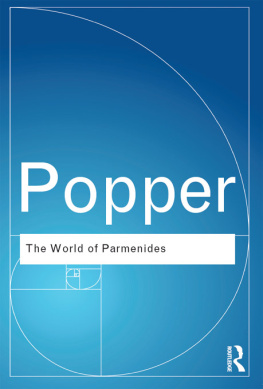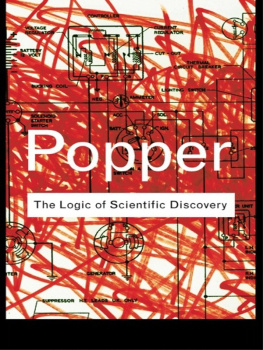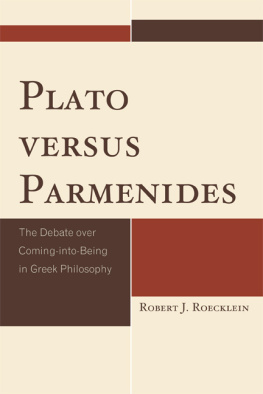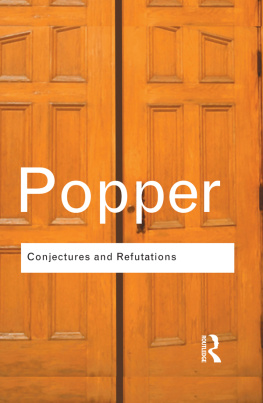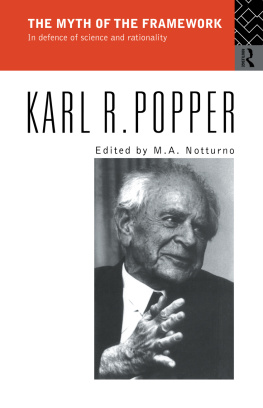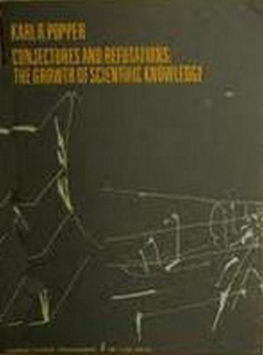Karl R. Popper - The World of Parmenides
Here you can read online Karl R. Popper - The World of Parmenides full text of the book (entire story) in english for free. Download pdf and epub, get meaning, cover and reviews about this ebook. year: 2012, publisher: Taylor & Francis, genre: Science. Description of the work, (preface) as well as reviews are available. Best literature library LitArk.com created for fans of good reading and offers a wide selection of genres:
Romance novel
Science fiction
Adventure
Detective
Science
History
Home and family
Prose
Art
Politics
Computer
Non-fiction
Religion
Business
Children
Humor
Choose a favorite category and find really read worthwhile books. Enjoy immersion in the world of imagination, feel the emotions of the characters or learn something new for yourself, make an fascinating discovery.
- Book:The World of Parmenides
- Author:
- Publisher:Taylor & Francis
- Genre:
- Year:2012
- Rating:3 / 5
- Favourites:Add to favourites
- Your mark:
- 60
- 1
- 2
- 3
- 4
- 5
The World of Parmenides: summary, description and annotation
We offer to read an annotation, description, summary or preface (depends on what the author of the book "The World of Parmenides" wrote himself). If you haven't found the necessary information about the book — write in the comments, we will try to find it.
The World of Parmenides — read online for free the complete book (whole text) full work
Below is the text of the book, divided by pages. System saving the place of the last page read, allows you to conveniently read the book "The World of Parmenides" online for free, without having to search again every time where you left off. Put a bookmark, and you can go to the page where you finished reading at any time.
Font size:
Interval:
Bookmark:

The World of Parmenides
I hope that these essays may illustrate the thesis that all history is or should be the history of problem situations, and that in following this principle we may further our understanding of the Presocratics and other thinkers of the past. The essays also try to show the greatness of the early Greek philosophers, who gave Europe its philosophy, its science, and its humanism.
Karl Popper, from the preface
A fascinating collection seminal.
Network
Karl Poppers essays pick out the complexity of Parmenides thought.
Oxon Book Review

Routledge Classics contains the very best of Routledge publishing over the past century or so, books that have, by popular consent, become established as classics in their field. Drawing on a fantastic heritage of innovative writing published by Routledge and its associated imprints, this series makes available in attractive, affordable form some of the most important works of modern times.
For a complete list of title visit
www.routledge.com/classics
Karl
Popper
The World of Parmenides
Essays on the Presocratic Enlightenment
With a new foreword by Scott Austin
Edited by Arne F. Petersen with the assistance of Jrgen Mejer

First published in 1998 by Routledge
First published in the Routledge Classics 2012
by Routledge
2 Park Square, Milton Park, Abingdon, Oxon OX14 4RN
Simultaneously published in the USA and Canada
by Routledge
711 Third Avenue, New York, NY 10017
Routledge is an imprint of the Taylor & Francis Group, an informa business
Introduction 2012 Scott Austin
1998, 2001, The Estate of Karl Popper
2012 University of Klagenfurt/Karl Popper Library
The right of Karl Popper to be identified as author of this work has been asserted by him in accordance with sections 77 and 78 of the Copyright, Designs and Patents Act 1988.
All rights reserved. No part of this book may be reprinted or reproduced or utilised in any form or by any electronic, mechanical, or other means, now known or hereafter invented, including photocopying and recording, or in any information storage or retrieval system, without permission in writing from the publishers.
Trademark notice : Product or corporate names may be trademarks or registered trademarks, and are used only for identification and explanation without intent to infringe.
British Library Cataloguing in Publication Data
A catalogue record for this book is available from the British Library
Library of Congress Cataloging in Publication Data
Popper, Karl R. (Karl Raimund), 1902-1994.
The world of Parmenides : essays on the Presocratic enlightenment/Karl Popper.
p. cm.(Routledge classics)
Includes bibliographical references and index.
1. Pre-Socratic philosophers. 2. Parmenides. I. Title.
B187.5.P66 2012
182.3dc23
2012001913
ISBN: 9780415518796 (pbk)
Typeset in Joanna
by RefineCatch Limited, Bungay, Suffolk
Those who are only familiar with the work of Sir Karl Popper as philosopher of science or defender of Enlightenment society against its enemies owe it to themselves to read this largely posthumous collection of essays. For it is here that we meet the sixteen-year-old Popper on a magic chariotride through the very origins of science themselves, the Presocratic philosophers, in an imaginative land halfway between myth and reason, an older dogmatism and a newer skepticism. It is here, also, that we get to see his own conjectures and refutations develop over time, his own tentative formulations and changes of mind, his own attempt to practice the method of inquiry that he attributes to Xenophanes and Parmenidesa refreshing exposure to a mind actually at work revising itself, not yet having lost its sense of mystery and new discovery. Routledge is to be commended for reissuing the book in the Routledge Classics series, for our picture of this philosopher and author is not complete without its delineation of his birth as a mind among the scattered shards of the birth of the Western mind itself.
This is not to say that the actual elements of Poppers construction will appeal to all. Few scholars would agree with his picture of Parmenidean truth as a dark sphere of impermeable matter. More, but still a minority, would agree with his claim that the philosophy of Plato is more favorable to science than the philosophy of Aristotle. But Popper was one who took the Presocratics seriouslyalthough not in the way in which they are today taken seriouslyand thus one who, as such, deserves gratitude and respect. For we still have not recovered from the lobotomizing effect of Aristotles slant on his predecessors as rudimentary thinkers, infant employers of reason, or simply bad scientists.
Poppers essays themselves are repetitive if read in the sequence in which the present volume presents them, but this is not necessarily a defect if what one wishes to see in them is the birth of a collection of living thoughts, always in the process of growth. The overall narrative might be summarized as follows. Popper finds in Xenophanes the first hint of the genuinely self-critical attitude which he wishes to attribute to science proper and to his own philosophy of science in particular. Mortals possess belief (as distinguished from knowledge), but can improve over time if they refrain from anthropocentrism in conjecture. There is no hint here of the dogmatic and political dangers Popper finds lurking in later, more ramified, systematic thinking. Parmenides, working with this inherited distinction between belief and knowledge, draws out its implications in an attempt to say what Truth would have to be in order to be knowableone of the first genuinely scientific Popperian conjectures. Parmenides is also a scientist in his own right, with his discovery that the moon receives her light from the sun and the theory of light and dark that Popper finds issuing from this discovery. Zeno, taking the hypothetical, conjectural method from his predecessors, refines it into an art of refutation through logical disproof. It is then with Plato and Aristotle that we get a quenching of the newly awakened scientific spirit. Platonic dialectic, although it is hypothetical, makes a dire pretense to certain knowledge in the political sphere; Aristotle, finding a justification for first principles in intuition alone (rather than in conjecture and refutation), abandons the fruitful skeptical attitude for a dogmatism which thereafter settles over philosophy and science for many centuries, a dogmatism whose ultimate political consequences are still visible in the after-effects of the Romantic reaction against the Enlightenment, in the enemies of the open society.
In this story of Poppers narrative I of course leave out of account many amplifications and side journeys: interpretations of Heraclitus and Pythagoras; an extension of the narrative into the Einsteinian and post-Einsteinian physics of space and time; comments on recent Parmenides scholarship, especially that of Charles Kahn and Alexander P.D. Mourelatos; contrasts between Platonic and Pythagorean methods of treating axioms and deductions from axioms; bits of philology and attempts to clear up translation problems (for example, in Parmenides fragment 16); and conjectures about Parmenides relationship with a blind or half-blind sister. Popper takes the Eleatics seriously enough so that they have something substantive to say to the physics contemporary with himself; they are astonishingly modern and post-modern, in no sense lost fragments of an antiquity that has receded beyond reach. Indeed, it is by touching base with them, he thinks, that we are to revitalize physics and philosophy of science, by keeping them faithful to their original missions.
Font size:
Interval:
Bookmark:
Similar books «The World of Parmenides»
Look at similar books to The World of Parmenides. We have selected literature similar in name and meaning in the hope of providing readers with more options to find new, interesting, not yet read works.
Discussion, reviews of the book The World of Parmenides and just readers' own opinions. Leave your comments, write what you think about the work, its meaning or the main characters. Specify what exactly you liked and what you didn't like, and why you think so.

